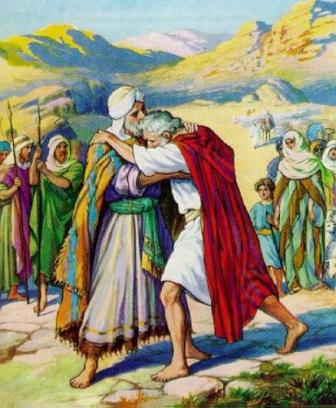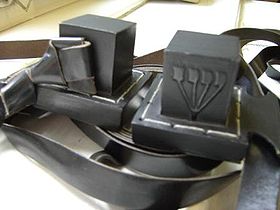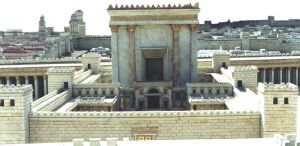Copy-Parshat Vayishlach
- Hits: 1739
Parashat Vayichlach

This week’s Sedra starts with Jacob sending messengers to his brother Esau. The Midrash tell us that these messengers were in fact angels. How do we know? In true Jewish style, let me answer with a question: which human would agree to meet Esau on behalf of Jacob?
Esau was hell bent on revenge, and would have killed anyone who had the slightest connection to Jacob. Indeed, the commentary Yalkut Shimoni tells us that Jacob had wanted to send humans, but nobody would go! These angels were sent to see if Esau was still angry. Our rabbis tell us that Jacob should have avoided this confrontation and not gambled on Esau’s good will. Jacob had proverbially pulled the (vicious) dog by the ears.
On meeting Esau, Jacob tells him that while he was working for Lavan, he had kept all 613 mitzvot. Why did he need to say this? Did he need to ‘boast’ to this wicked man to make him look good? Actually, we must realise what Esau’s frame of mind was. He wanted to give Jacob the ‘kiss of death’ by ingratiating himself to Jacob and therefore drawing him and his sons to him, and thus leave the way of G-d. Jacob’s message was that if Esau was trying to do this, he would labour in vain. “If I kept all the mitzvot in Lavan’s house,” says Jacob, “then surely I can keep them now.” This was also to say that if he could remain righteous outside of Israel, he would surely succeed within Israel.
After Jacob and his family had crossed the river Jabok, Jacob returned alone to see if he had forgotten anything. He found that he had left some small containers of oil. Why did he bother to risk his life (he was by himself) for such seemingly insignificant pots of oil? We are told that a tzaddik values the smallest of his possessions and would not let anything go to waste, as each of his belongings has been acquired honestly. Indeed, there is an opinion that these containers were the pots of oil that lasted for eight days, that comprised the miracle of Chanuka in the Temple.
The verse says “Jacob was left alone, and a man wrestled with him”, showing that as soon as a tzaddik is left alone, trouble follows. This was no man, but an angel; in fact, he was the angel of Esau himself. This angel fought with Jacob until dawn, and when he found out that he couldn’t prevail against Jacob, he struck him on the knee.
What is the significance of this fight? And why did the angel try and get the last laugh by hitting Jacob on the leg? I heard a very interesting explanation from my Rabbi, Harav Moshe Cohen, in the name of the Zohar. As we said last week, a recurring theme within the Book of Genesis is ‘maaseh avot siman lebanim’ (the deeds of our forefathers serve as a precedent for future generations). The fight between Jacob (the Jews) and the angel of Esau (Satan) serves as a lesson for our times. These days, thank G-d, the Torah is being studied more than ever. Satan (the accusing angel) tries his hardest to stop people from learning. When he sees that he can’t succeed (for there are more yeshivot now than ever) he tries to ‘strike at the leg’. On what ‘legs’ does the yeshiva stand? The financial supporters. Satan then approaches these people and ‘strikes’ them. When asked for donations to support the yeshivas, these supporters then say that they ‘cannot’ donate. Just like a man cannot stand on his legs, a place of Torah study cannot stand without its financial support.
However, in the commentary “Oznayim LeTorah” it says that the Torah will never be forgotten by the Jewish people, even if its financial support decreases. How, therefore, can a person be blamed if he does not want to support Torah? Surely, whether he gives or not, it won’t make a difference to the Torah, which is everlasting. This incident will help you understand.
A man was once approached Rabbi Moshe Cohen to donate money to a certain yeshiva. This fellow said “Is it not enough that people sit learning all day without working, that I should pay them also?” Rabbi Cohen replied “You are right. You don’t need to pay them. But because of you, the Torah may not be studied in that place. Do you want to take that chance?”
The Torah will never be forgotten by the Jews, although it may be hindered. The question is, do you want that to be on your account? Are you ready to take that risk?
After the angel was defeated, he asks Jacob “What is your name?”, but when Jacob asks the angel his name, the angel replies “Why do you ask?” This seemingly trivial incident also has relevance today. When we Jews meet each other in the street (wherever we are) we always ask each other the same questions: who are you, what do you do and who do you know. Each one answers freely – after all, we are all well-versed in Jewish Social Geography. Gentiles are not accustomed to these questions, and typically respond “What do you care?”
On finally meeting Esau himself, the Torah tells us “Esau ran towards him, embraced him, fell upon his neck and kissed him”. On first reading, this seems like a suitably soppy ending and makes one want to go ‘aaah!’. However, the Midrash tells us a very different story. Surprise, surprise – Esau’s heart was full of malice. “Rather than shooting Jacob with my bow,” he thought, “I shall let him come close, bite him, and suck the blood out of his body!” (I wonder if Percy Byshe Shelley knew that his idea for Dracula was Midrashic). A miracle occurred, and Jacob’s neck was turned to marble, while Esau’s teeth became as soft as wax. Both wept – Jacob because his stiff neck was painful, and Esau because of his teeth! This is yet another sign for the future. Just as Esau’s attempt to kill Jacob had failed, so would Hashem protect his children from the onslaught of the nations.
Esau then says “What did you intend by that whole camp that I met?” Jacob answers “To gain favour in your eyes”. The Midrash throws another spanner into the works by telling us that the camp that Esau was referring to was not the band of friendly angels that we have just talked about, but four bands of destroying angels who had met Esau and beat him cruelly. In this case, why did Jacob say that he had sent them to find favour in Esau’s eyes?
Later on in the sedra, we are told of the sorrowful incident with Dina, who was raped by Shechem the king of Chamor. When Jacob and his family encamped there, Shechem brought girls who sang and played drums to perform in front of Jacob’s tents. While her brothers were learning Torah, Dina slipped out to watch the performance. Our Sages tell us that since they were negligent in guarding Dina, this whole sad story came to pass. The story is recorded in the Torah to show that a woman should behave modestly in public. This is the reason why Hashem created Eve from the Adam’s rib, which is a concealed part of the body. He was trying to teach the woman that she came from a hidden place, and she must also keep herself hidden.
The straw stated “It was for my sake that the whole field was sowed.” The stubble called out “The field was sowed for me!” The chaff persisted “The field was sowed only for me!” The wheat did not respond, but replied instead “Wait until the harvest time and you will find out which one of us the farmer stores in his granary!”
Harvest time came, and the farmer cut the wheat in the fields and harvested the crops. He winnowed the wheat, and the chaff flew away in the wind. He took the straw and dumped it aside on the ground. He burnt the stubble of the fields. Then he crated the wheat kernels and stored them away in the granary. Whoever saw the precious grain treated it with the greatest reverence.
Similarly, every nation claims, “We are the goal of Creation!” The Jews answer them “The day will arrive when it will be evident for whom the world was created; on that day the people of Israel’s greatness will shine out!”
May that day come soon!
SHABBAT SHALOM





